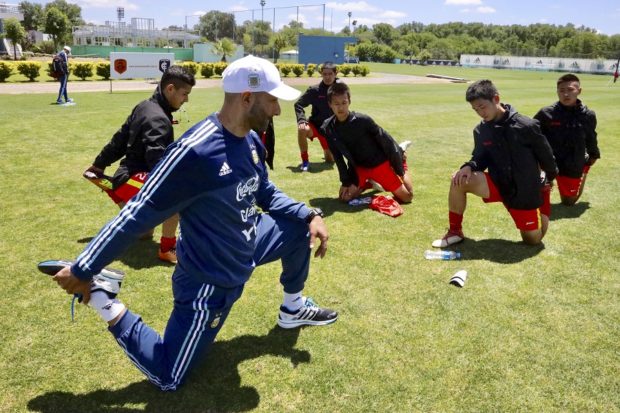
An Argentine soccer coach trains young Chinese players, affiliated with Beijing Sport University, in Buenos Aires, Argentina, on Sunday. China Daily/Asia News Network/XU JINGXING
BEIJING – The China-Argentina Football Cooperation Program, which has been gaining steam since the two countries signed an agreement in May last year, aims to seek out a Chinese version of Lionel Messi, the Argentine soccer superstar, according to an Argentine official with the program.
Pablo Diaz, executive secretary of the program, said in an interview with China Daily that Argentina is willing to share its soccer assets to help China realize its goal of becoming a world soccer power before 2050.
A group of 28 Chinese boys ranging in age from 14 to 16, along with three Chinese coaches, arrived in Buenos Aires last month, shortly before President Xi Jinping’s visit to attend the G20 Leaders’ Summit in the Argentine capital and his state visit to the South American country, which concluded over the weekend.
The promising young athletes will stay in Argentina for 10 months, during which time they will compete in approximately 30 friendly matches against Banfield Club and other Argentine youth teams. They will also receive specific training under the supervision of Banfield’s coaching and physical conditioning staff.
The youth program is the result of the deal signed by the two countries during Argentine President Mauricio Macri’s visit to China last year, Diaz said.
This is the first time that Argentina and China have cooperated in this way.
Banfield is not the largest club in the country, but was carefully selected from among 10 candidates, Diaz said.
“We want these kids to be treated like family. Because of the cultural differences, mostly in food and climate, it is good for the group of kids to experience a welcoming environment so they can live, train and play together,” he added.
The boys will spend their first month at the Argentine Football Association’s training facilities — where the country’s national soccer team is trained — before moving to Banfield Club.
Fourteen-year-old Yu Runze was excited to learn that he would be staying in the same room that Messi uses during training.
“I’m a real fan of Messi and I’m so lucky to be here. I cherish the opportunity to be here for training, and the Argentine coaches are very nice to us. I really hope I can take advantage of the training to improve myself,” Yu said.
The program will continue next year, and more Chinese youth will come to Argentina, Diaz said.
“Gradually, we learn what the kids need, what they want to eat and how to accommodate them in ways to make them feel comfortable,” he said. “We will replicate the Banfield experience with more clubs in Argentina. Now we have a set of procedures on how to work with the Chinese kids, and how best to develop their day-by-day training program.”
For the second step, Diaz is considering selecting Argentine coaches to go to China to offer guidance to Chinese coaches on how to train the next generation of Chinese soccer players.
The third step is to have both Chinese super leagues play each other to boost their competitiveness, he said, adding that Argentina is ready to receive qualified Chinese talent to play in the Argentine super league in the future.
“Soccer is something that unites people. It symbolizes friendship and cultural exchange, so we believe this is a small step toward greater friendship between our two countries,” Diaz said.
Calling soccer “a religion in Argentina”, Diaz said that when a massive population of youngsters takes to playing soccer in China, it’s only a matter of time before the next Messi is identified.